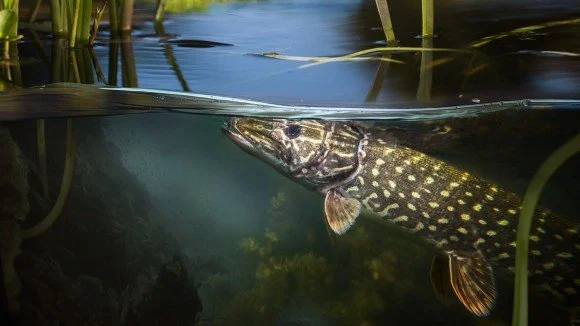Invasive mussels are still making headlines, as their impacts continue to threaten Great Lakes whitefish on both sides of the U.S.–Canada border.
Read MoreA new study co-authored by the Centre for Ecosystem Management’s Dr. Kevin McCann reveals that agricultural land use—especially nutrient runoff and the loss of streamside vegetation—is reshaping how energy flows through stream food webs.
Read MoreBridge Michigan reporter Kelly House is highlighting a distressing trend: lake whitefish (or adikameg, in the Anishinaabe language) — once a staple in the diets and culture of those living along the shores of the Great Lakes — are now on the verge of collapse in Lakes Michigan and Huron.
Read MoreToday, May 22, marks the International Day for Biological Diversity, a global occasion to reflect on and reaffirm our collective commitment to protecting the natural world.
Read MoreWe are proud to share that Dr. Joey Bernhardt, Assistant Professor and researcher with the Centre for Ecosystem Management (CEM) at the University of Guelph, has been named an Early Career Fellow by the Ecological Society of America (ESA).
Read MoreThe Nature Collection titled "Freshwater ecosystems under global change" spotlights the critical yet often underrepresented role of freshwater systems—rivers, lakes, wetlands—in global ecological processes and human well-being.
Read MoreOn September 25 & 26th, 2024, the Canada Water Agency - a federal initiative operating under Environment and Climate Change Canada - hosted the National Freshwater Data Strategy Workshop.
Read MoreNew research, conducted in part by the CEM’s Director Dr. Kevin McCann, reveals the steep biodiversity costs of global food production. The Conversation explores what’s really at stake.
Read MoreFreshwater ecosystems, though covering just 1% of Earth's surface, support over 10% of known species, illustrating their crucial role in global biodiversity.
Read MoreAt COP16, Ecojustice, Greenpeace Canada, and other environmental groups urged Canada’s Parliament to pass Bill C-73, the Nature Accountability Act, which has stalled since its introduction.
Read MoreThe Great Lakes are the focus of two compelling new documentaries, The Fish Thief and All Too Clear, each highlighting pressing environmental challenges.
Read MoreHarmful algal blooms (HABs) are becoming a significant environmental concern, driven by rising temperatures and pollution. These blooms, often fueled by agricultural runoff and sewage, can turn our drinking water toxic and pose serious health risks to humans and animals.
Read MoreCBC’s podcast Quirks & Quarks recently featured the paper published in Nature Ecology and Evolution, co-authored by CEM researchers, that explores how our global food systems are becoming less diverse and more susceptible to climate change.
Read MoreThe Nature Accountability Act (Bill C-73) aims to hold Canada accountable for its biodiversity commitments, addressing a dire nature crisis marked by habitat destruction and species decline.
Read MoreTune in to The Fisheries Podcast’s most recent episode featuring our own Dr. Joey Bernhardt, where she delves into her fascinating career path and shares the passions that drive her work.
Read MoreOntario's conservation authorities are facing pivotal changes that could reshape their role in environmental oversight. The recent amendments to the Conservation Authorities Act have granted the Minister of Natural Resources new powers to issue development permits without the need for a review by conservation authorities.
Read MoreThe Freshwater Challenge (FWC) emerges as a country-led initiative seeking to restore 300,000 km of degraded rivers, conserve 350 million hectares of wetlands, and protect intact freshwater ecosystems by 2030.
Read More
















